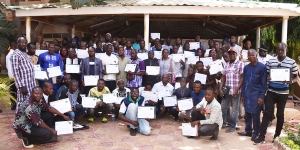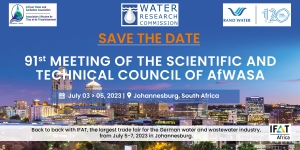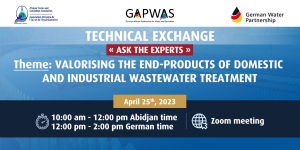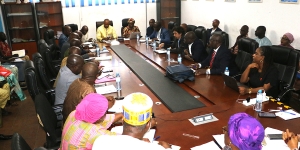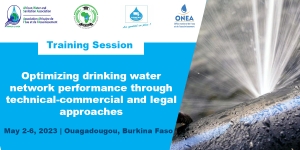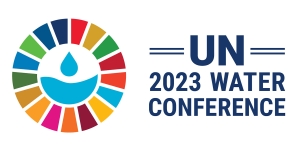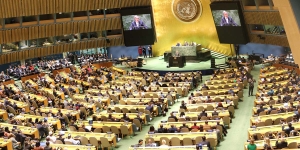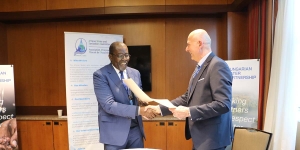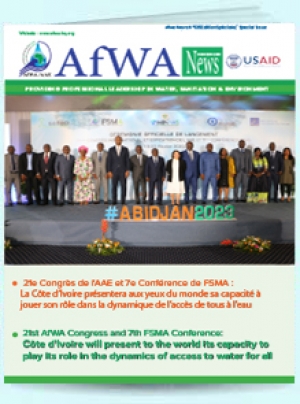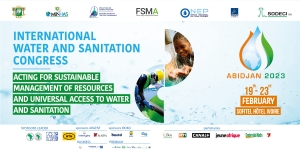Nzickonan Stéphanie
Non sewered sanitation: AfWASA teaches good emptying practices to Burkina Faso actors
Non sewered sanitation: AfWASA teaches good emptying practices to Burkina Faso actors
From April 24 to May 6, 2023, AfWASA organized a capacity building workshop for the faecal sludge management actors of Burkina Faso. Approximately 80 mechanical and manual emptying workers and business managers from the cities of Bobo-Dioulasso and Ouagadougou benefited from this training.
The objective was to teach them the best practices of their trade, practices that preserve their health and the environment, the maintenance of the vehicles of emptying, the security measures to be observed, the adequate equipment and the administrative and financial management of their company. The goal is the professionalization of their activity, the delivery of quality services and a better view of the population on their profession.
For Ousseini Ouédraogo, General Secretary of the Association of emptiers of Bobo, the training will change the way emptiers in Burkina Faso do business: "We have learned, among other things, that for our health and the health of the population, we must stop Indiscriminate disposal of feacal sludge. We must discharge them at the treatment plant. We also learned that during the emptying process, we must separate wastewater from fecal sludge. Finally, we
learned that our job will be appreciated by the population only if we value it and this valorisation must be started by wearing clean clothes when we present ourselves in front of a client.
He expressed the wish that all the emptiers of Burkina Faso could benefit from this training. But in the meantime, he plans a restitution to the members of his association.
This training workshop is part of a program funded by the Bill and Melinda Gates Foundation through the EDE/TA Hub, of which the National Water and Sanitation Office is the main beneficiary. It was conducted by AfWASA in collaboration with its Regional Implementing Partner (PREMO), the Centre des Métiers de l'Eau (CEMEAU) of Burkina Faso.
AfWASA 91st STC: South Africa about to welcome African water and sanitation experts
The African Water and Sanitation Association is delighted to inform its members as well as the entire water and sanitation sector community that the 91st meeting of its Scientific and Technical Council (STC) will be held from July 3rd to 5th, 2023 in Johannesburg, South Africa, under the theme “From AfWA to AfWASA: What governance and management structures to boost water and sanitation performance in Africa".
This 91st meeting, which is held in a context of restructuring of the CST, will be marked by the effective establishment of the new Strategic and Technological Council, replacing the Scientific and Technical Council, and by the launch of calls for proposals for specialist committees.
AfWASA hereby invites all stakeholders as well as all those interested in the development of the water and sanitation sector on the continent, to save the date to participate in this meeting of exchanges around the challenges of access to water and sanitation in Africa.
It is important to flag that the 91st AfWASA STC meeting is co-hosted by Rand Water and the Water research Commission and will take place back-to-back with IFAT, the largest German trade fair for the water and wastewater industry.
The registration link as well as the agenda will be communicated to you soon.
Domestic and Industrial Wastewater Treatment: Experts share their Experiences
The German African Partnership for Water and Sanitation (GAPWAS) is the cooperation project between the African Water and Sanitation Association (AfWASA) and the German Water Partnership (GWP), financed by the German Federal Ministry for Economic Cooperation and Development (BMZ) via the sequa gGmbH. One of the goals of GAPWAS is to facilitate joint workshops as well as technical and peer to peer exchange and to foster contacts between members of GWP and AfWASA.
The present concept contributes to these goals by combining the expertise of German and African experts in the field of water and sanitation in the form of a jointly given interactive workshop for the members of both associations. The joint identification of workshop topics and the opportunity to ask questions underscores the mutual intention to address and share knowledge on real challenges and needs of AfWASA members and thus contribute to improving drinking water supply and sanitation including reuse in the region.
The workshop is conducted online for 2 hours and takes place every two to three months. Each workshop is conducted under a specific technical topic with two experts being members of GWP and two experts from the membership or network of AfWASA.
Ask the experts – 6th edition
The 6th edition of the “Ask the experts” series will be organized on 25th April 2023 at 10h00 UTC (Abidjan time) and the topic to be treated will be:
“Valorising the end-products of domestic and industrial wastewater treatment”.
Wastewater contains essential resources, whose value is increasingly getting appreciated. Along with the global acceptance and support for adopting the paradigm of circular economy, the term ‘waste’water often is replaced by ‘used’water. The formerly ‘wasted’ resources of water, energy and nutrients are getting increasingly expensive and/ or scarce.
Therefore, today’s wastewater treatment systems should be planned from the end: who needs and commits to reuse the treated water, energy and nutrients? What qualities and quantities are needed? This information will guide the design process, i.e. where and how wastewater is collected and treated and corresponding technologies.
The invited Experts will present and discuss two cases:
-
Reuse of excess sludge from industrial wastewater treatment in Ethiopia
The Capital of Addis Ababa has established new industrial clusters. The wastewater of the textile cluster is treated in the industrial park's treatment plant. The produced excess sludge still contains industrial contaminants and therefore is not suitable for agricultural re-use. However, a nearby cement factory is constantly in need of fuel. The experts will describe and explain, how a solar drying process is successfully applied to produce a sludge with 90% dry matter ready to be co- incinerated in the cement factory as renewable energy fuel. The project is enabled and financed by the GIZ facility DeveloPPP.de.
-
Reuse of energy and water from domestic wastewater treatment in the Germany & Namibia
The Free Hanseatic City of Bremen’s wastewater treatment plant has adopted anaerobic digestion of its excess sludge and producing electricity from the captured biogas to power it’s blower units for the activated sludge process as early as 1966. Since 2014, the utility including the wastewater treatment works – one of the highest energy consumers in many cities around the globe –are fully energy neutral, thanks to a number of additional measures taken over the years.
The City of Windhoek is situated in a desert-like climate with an average annual rainfall around 360 mm and an annual evaporation of 3,400 mm. It is known for having started reusing parts of its treated domestic wastewater for drinking water production as early as 1969. Over the years, it’s facilities for treating and reclaiming wastewater for potable use have been updated in an effort to cope with a population having grown from less than 100,000 inhabitants in 1980 to more than 430,000 in 2020.
Besides sharing impressive facts and figures around the reuse of water, energy and nutrients in Bremen and Windhoek, the experts will share important elements of their learning journey from day-to-day operation of treatment plants, e.g., understanding the performance of the plant at different steps of the treatment process with the help of taking and analysing samples for systematic C-N-P balances (critical Carbon-Nitrogen-Phosphorous ratio).
22nd AfWASA Congress, Conakry 2024: a Delegation from AfWASA on mission in Guinea
A delegation from the African Water and Sanitation Association (AfWASA), led by its Executive Director Mr. Sylvain Usher, is in Conakry, Guinea, from April 12 to 14, 2023, as part of the preparations of the 22nd AfWASA International Congress and Exhibition. The objective of this mission is to support the Local Organizing Committee (LOC), and to share experiences for a successful event.
During the discussions, the chairman of the LOC, Mr. Camara Aboubacar, General Manager of the Société des Eaux de Guinée (SEG), welcomed the decision of AfWASA to allow Guinea to host its 22nd Congress, "despite the exceptional situation it is going through".
It is a sign of the trust you place in us, and we are committed to proving that we can overcome the challenge," Camara said
Guinea is called "the water tower of Africa" because of its vast water potential. However, access of the populations to water remains a challenge. Organizing this congress will allow the population to realize that the issue of access to water and sanitation services is at the heart of the country's authorities' concerns, and that they are doing their best to address it," continued the SEG's General Director.
The Executive Director of AfWASA, Sylvain Usher, welcomed the willingness of Guinea to organize the event. He reaffirmed his confidence in the team and in its ability to successfully carry out all activities.
The discussion session was followed by an experience sharing on the organization of the 21st AfWASA Congress held in February 2023 in Abidjan, the working sessions of the subcommittees and finally the visit of the Palais du Peuple of Guinea, where the Congress will be held.
All in Guinea Conakry, from 18 to 22 February 2024 for the 22nd AfWASA International Congress and Exhibition.
Vocational Training: AfWASA is Organizing a Training on Operation of Drinking Water Network
Technical Sheet
The training will be conducted in French
Registration link : https://training.afwasa.org/formation/registration/form-training/104
|
Domain |
Operation of drinking water network |
Activities |
Performance improvement |
|||||
|
Module |
Optimizing drinking water network performance through technical-commercial and legal approaches |
Code |
||||||
|
General objective |
Improving the performances of water utility |
|||||||
|
Operational Objectives |
At the end this training, participants will be able to:
|
|||||||
|
Content |
The content below will be developed to achieve the above objectives.
|
|||||||
|
Duration |
30 h (5 days) plan a field visit and a commercial service |
|||||||
|
Target Audience |
General managers of water utilities, Technical and commercial managers of water utilities, Drinking water network operators, Network technicians, Customer, billing and sales managers, Legal advisors of water utilities |
|||||||
|
Background |
Varied experiences in drinking water management |
|||||||
|
LEARNING SITUATIONS |
||||||||
|
Presentation: 50% |
Tutorial : 35% |
Visit : 15% |
Pratical works : 0% |
|||||
Click on the link to register : https://training.afwasa.org/formation/registration/form-training/104
UN Water Conference 2023: recommandations from the interactives dialogues
The United Nations Conference on the Midterm Comprehensive Review of the Implementation of the objectives of the International Decade for Action ‘’Water and Sustainable Development’’ (2018-2028) was held from 22 to 24 March 2023 in New York. The conference brought together heads of state and government, ministers, and stakeholders from all sectors to jointly assess the international agreed goals, including Sustainable Development Goal 6 of the 2030 Agenda for a More Just Future, which aims to ensure access to safe drinking water, sanitation and hygiene for all.
The conference was marked by special events, side events, plenary sessions and interactive dialogues.
AfWASA is delighted to share with you the main recommendations of these interactives dialogues.
UN Conference on Water: an Action Program for Water to Guarantee its Access to all was Approved
The UN 2023 Water Conference closed on Friday with the adoption of the Water Action Agenda, a “milestone” action plan containing almost 700 commitments to protect “humanity’s most precious global common good”.
Below is the statement of Mr. Antonio Guterres, General Secretaruy of UN
Mr. President, excellencies, colleagues, friends,
My thanks to the Netherlands and Tajikistan for co-hosting this conference — a milestone at the midway point of the Water Action Decade.
I also thank the President of the General Assembly, and the representatives of all levels of government who attended — as well as the scientists, academics, civil society groups, indigenous peoples, members of the private sector and young people who have joined us.
Together, your ambitious vision and dedication to action and transformation is propelling us towards a sustainable, equitable and inclusive water-secure future for people and planet alike.
Dear friends,
This conference demonstrated a central truth.
As humanity’s most precious global common good, water unites us all.
And it flows across a number of global challenges.
Water is about health, sanitation, hygiene and disease-prevention.
Water is about peace.
Water is about sustainable development, fighting poverty, supporting food systems and creating jobs and prosperity.
Water is about human rights and gender equality.
That’s why water needs to be at the centre of the global political agenda.
All of humanity’s hopes for the future depend, in some way, on charting a new science-based course to bring the Water Action Agenda to life.
They depend on realizing the game-changing, inclusive and action-oriented commitments made by Member States and others at this Conference.
This means reinforcing water’s place as a fundamental human right.
It means reducing the pressures on our hydrological system, and ensuring good decision-making and smart policies.
It means developing new, alternative food systems to reduce the unsustainable use of water in food production and agriculture.
It means designing and implementing a new global water information system to guide plans and priorities by 2030.
It means integrating our approach on water, ecosystems and climate to reduce greenhouse gas emissions and strengthen communities.
This includes resilient infrastructure, water pipelines and wastewater treatment plans, and ensuring every person in the world is protected with early warning systems against natural disasters by 2027.
It means continuing to press for climate justice and global action to limit global warming to a 1.5 degree rise.
And it means dramatically accelerating resources and investment into the ability of all countries to reach Sustainable Development Goal 6.
A number of other follow-up steps are under consideration – including the appointment of a Special Envoy on Water to advance the prominence of water in the lead-up to this September’s SDG Summit, as well as the Summit of the Future next year.
I look forward to reviewing our progress during July’s high level political meetings.
And I can assure the full support of the United Nations system every step of the way.
Excellencies, ladies and gentlemen,
Without water, there can be no sustainable development.
As we leave this historic conference, let’s re-commit to our common future.
Let’s take the next steps in our journey to a water-secure future for all.
Once again, I thank the Netherlands, Tajikistan and the President of the General Assembly for their leadership.
Together, you’ve brought the world together around solving the water challenge and reinforcing international collaboration for this vital resource.
And I thank all those who contributed their ideas to this conference, and to the creation of the Water Action Agenda.
Excellencies,
Now is the time to act.
Thank you.
Partnership: AfWASA signed a Memorandum of Understanding with the European Water Association
On the sidelines of the United Nations Water Conference being held in New York, AfWASA signed a partnership agreement with the European Water Association. this partnership aims at consolidating and strengthening their relationship on water and sanitation related advocacy, human capital development support, sharing of insights, approaches and opportunities.
There should be self-sufficiency in drinking water and health safety in Africa
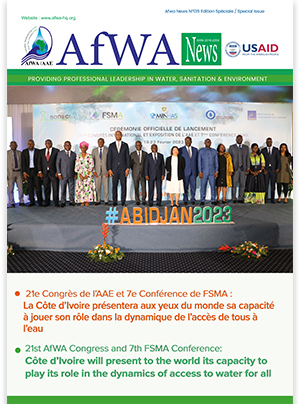 "There should be self-sufficiency in drinking water and health safety in Africa"
"There should be self-sufficiency in drinking water and health safety in Africa"
Mr. Bouaké Fofana, Minister of Water Resources, Sanitation and Hygiene, Republic of Côte d’Ivoire
Côte d’Ivoire is honoured to host the 21st International AfWA Congress and Exhibition, and the 7th International Conference on Sludge Management from 19 to 23 February 2023. On behalf of the President of the Republic, H.E. Alassane Ouattara, the members of the Government, the Prime Minister, Patrick ACHI, and all the people living in Côte d’Ivoire, I would like to wish the various delegations, Experts and all the participants who have come to take part in these meetings, «Akwaba» or Welcome, through this «AfWA News 135th Special Congress». Côte d’Ivoire is honoured to host the 21st International AfWA Congress and Exhibition, and the 7th International Conference on Sludge Management from 19 to 23 February 2023. On behalf of the President of the Republic, H.E. Alassane Ouattara, the members of the Government, the Prime Minister, Patrick ACHI, and all the people living in Côte d’Ivoire, I would like to wish the various delegations, Experts and all the participants who have come to take part in these meetings, «Akwaba» or Welcome, through this «AfWA News 135th Special Congress».
I would like to express my hope that these meetings, placed under the critical theme «Acting for a Sustainable Management of Resources and Access to Water and Sanitation for All», will achieve their objectives, and that the Abidjan meeting, coming after the one held in Kampala (Uganda) in 2020, will be a milestone in the search for innovative solutions for access to drinking water and sanitation for all in Africa.
The water and sanitation situation in Africa is indeed at the heart of the concerns of African governments. In some African countries, as in other regions, the situation is not improving, but sometimes worsening. The pressure on the resource is increasing and we have seen serious crises in recent years. Self-sufficiency in drinking water and health safety is one of our major challenges. Some countries like ours have made significant efforts and progress. The theme of this major international meeting is a response to these concerns and a pressing challenge for all decision-makers.Crisis situations, natural disasters and conflicts in Africa require that the international community, and particularly African Experts, come together to assess the nature of relief and assistance for the improvement of the well-being of African populations.
Increasingly, there is talk of integrated water resource management. We are part of this vision, which is why I think it is necessary to think about it further.
In Côte d’Ivoire, several actions are being undertaken to mobilise resources for the development of the water and sanitation sectors. Furthermore, brainstorming is on-going to implement better governance of water and sanitation. Improved management of resources and means will enable us to meet the commitments of Goal 6 of the MDGs: «Ensure access to water and sanitation for all and ensure sustainable management of water resources».
We know that Africa is waiting for concrete answers; in particular, how to achieve the ambitious goal of MDG 6 which is the reason for this 21st AfWA International Congress and Exhibition and the 7th Conference of the Alliance for Sludge Management.
Welcome and fruitful deliberations to all!
ABIDJAN DECLARATION for a sustainable management of resources and access for all to water and sanitation in Africa
The 21st AfWA International Congress and Exhibition and the 7th Conference on Faecal Sludge Management took place from February 19 to 23, 2023 in Abidjan, under the theme : acting for sustainable resource management and access to water and sanitation services for all in Africa.
At the end of the congress, the following statement was made:
We, the Ministers in charge of water and sanitation issues present at the 21st Congress of the African Water Association and the 7th International Conference on Sludge Management,
- Guided by the principles and ideals of the United Nations Charter;
- Recognizing that access to safe drinking water and sanitation is essential for economic and social development;
- Recognizing the need to implement integrated water resource management to ensure the use of water for all present purposes and the preservation of water for future purposes;

 English
English  Français
Français 
